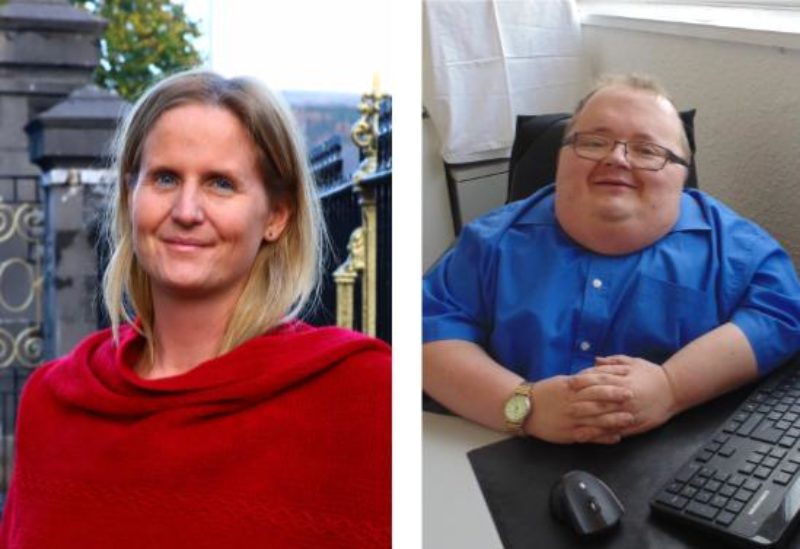Beth Winter MP

Beth Winter MP and Richard Jones Chair of Cynon Valley Constituency Labour Party
November marked the 25th anniversary of the Disability Discrimination Act. In Wales some 22% of the population has a disability, facing difficulties across a range of services – from employment to housing to transport and education. But we also have some innovative legislation that can help to alleviate some of these difficulties, and as Jane Hutt MS says in her introduction to Welsh Government’s Action on Disability: The Right to Independent Living “Supporting people to live in the way that they choose is the right thing to do.”
In 2021 we have the Senedd elections and Disability Wales is producing its own Disabled People’s Manifesto, to highlight what disabled people feel are the priorities for action because behind the statistics and legislation there are people who live the experience. That’s why this article is written in conjunction with Richard Jones. It couldn’t and shouldn’t be written without the involvement of someone who, like Richard, is a disabled person.
Both Richard and I have a life-long commitment to campaigning against disability discrimination acknowledging we come from different experiences. While I have campaigned on specific issues, like meeting people’s housing needs, Richard has lived the experience having been born with osteogenesis imperfecta, more commonly known as ‘brittle bones’. Richard‘s life is testament to his determination, with family support, to focus on his ability – not his disability. Born in 1981 Richard was able to attend mainstream education, but only after overcoming many obstacles both attitudinal and physical. He now runs two successful businesses, one of which, a disability consultancy company, enables him to pursue his commitment to tackling discrimination through disability rights campaigns, research, and training.
As Richard says “I’ve always wanted to challenge misconceptions of disabled people portrayed in the media and in public life, to remove the tokenism and pity that exists and open people’s minds. I don’t see my disability. It is people and society that force it on me.”
It has been a long and arduous journey for disabled people in the UK. It was not until the 1980’s that the campaign for disability rights gained real traction which culminated in the Disability Discrimination Act in 1995 making it illegal to discriminate against a disabled person and required reasonable adjustments to be made for disabled people. This was superseded by the Equality Act in 2010 which strengthened and extended the protection and rights of disabled people. Richard however still feels that there is a need to push disability rights further up the agenda: ‘I am concerned”, he says “that there is a hierarchy in discrimination and disability often does not have equal standing with other areas of discrimination. My drum doesn’t bang as loud as others”.
While progress has been made over the last 25 years there is still much to do, and Richard believes that in recent years disability rights have fallen down the agenda. Much of this can be attributed to the 10 years of Tory government austerity which saw huge cutbacks in services and benefits for disabled people, preventing many going out to work and living independently. A higher percentage of disabled people live in poverty than is the case for the population as a whole in the UK. Richard also feels that this has been highlighted further during the Covid pandemic which he feels has exposed the inequities and discrimination that persist for disabled people.
He did not leave home for 180 days and feels that there hasn’t always been the understanding of what this has meant for people like him. Alongside work Richard has always had a very active social life meeting with his many friends. He misses this and gets angry when other people won’t obey the rules to keep everyone safe. While Richard’s businesses have struggled, they are surviving, and new opportunities have emerged like online meetings and training and he has adapted his business model accordingly.
Still, he has found lockdown difficult. “I didn’t think I would cope” he says, “but I’ve just got on with it”. He says he knows many people who’ve found it very difficult and has lost 2 friends during lockdown. Almost 60% of deaths from Coronavirus in the UK have been amongst disabled people. As well as mental health and isolation and being reminded of one’s mortality, the lack of availability of non-Covid medical treatments are seen by Richard as being the main Covid issues for him.
None of this has stopped Richard who, as well as owning two businesses and being Chair of my Constituency Labour Party, is a Community Councillor, the Chair of two local charities and stood for election as a local Councillor in 2017, and is planning to do so again in just over a year’s time. Richard and I agree that there are far too few disabled people in positions of influence, and we want a society in which opportunity and success for disabled people is the norm, not the exception.
I will give Richard the last word: “Disabled people need to come together as other disadvantaged groups have and continue the fight to be treated with dignity, equality, and respect.”
